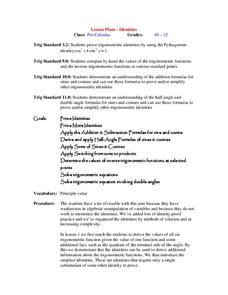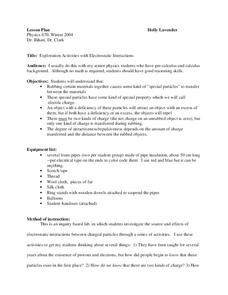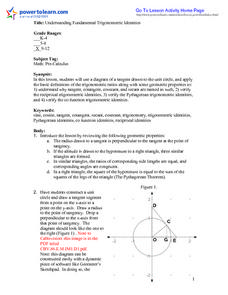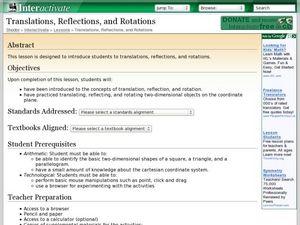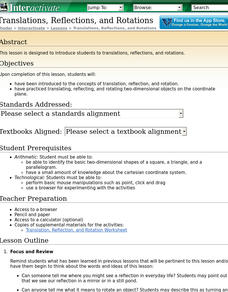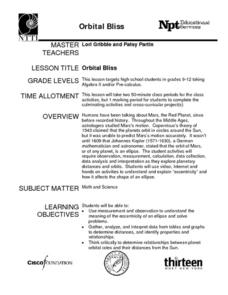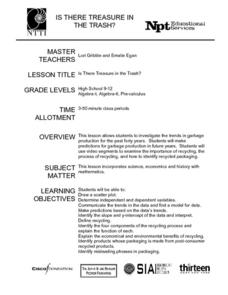Curated OER
Identities and Trigonometric Values
Students solve trigonometric equations. In this precalculus lesson plan, students prove trigonometric identities using the Pythagorean Theorem. They apply the addition formulas for sine and cosine to prove different identities.
Curated OER
Arithmetic Complex Numbers
Students convert quadratic functions from standard form to vertex form. In this algebra instructional activity, students solve polynomials using synthetic and long division. They derive and apply the remainder theorem and factor theorem.
Curated OER
Combination and Permutations
Students decide when to use computation and permutation to solve problems. In this algebra lesson, students apply the correct method to solve complex set of events. They differentiate between dependent and independent events.
Curated OER
Race The Rapper: Slopes
Young scholars calculate the slope of the equation In this algebra lesson, students graph coordinate pairs of linear equations and identify the relationship between x and y values and slope. They differentiate between functions and...
Ohio State University
Exploration Activities with Electrostatic Interactions
Step out of the 21st century and discover protons and electrons through observation. Using common materials, participants continually adjust their explanation of charges. The final assessment requires pupils to design their own...
Curated OER
Unit Circle Triangle
Students find the different ratios of a right triangle. In this geometry lesson plan, students apply the concept of the Pythagorean theorem as they identify the different angles and parts of a Unit Circle. They find the ratios of sine,...
Curated OER
Understanding Fundamental Trigonometric Identities
Students are introduced to the basic trigonometric identities. Using a diagram, they discover why the parts of the unit circle as named as they are and use equations to finalize the Pythagorean trigonometric identities. They also review...
Curated OER
Cross Section and Slope
Students draw cross sections of given contour maps. In this math lesson, students interpret the different symbols used in the map. They determine slope and steepness through direct measurement.
Curated OER
Kinematics of the Planar Continuum Snake Robot
Students calculate the length of an arc that surrounds an angle at the center of a circle of radius. In this kinetic equations lesson plan students complete a lab and solve a kinematic equation.
Curated OER
Mathematics
Twelfth graders explore a variation of proof. In this geometry lesson, 12th graders apply their knowledge of proof to different scenario. They use 3 different tiers to advance through the lesson.
Curated OER
L'Hopital's Rule
Pupils discover and perfect methods of calculation based on rewriting, simplifying, and logarithmic L'Hopital when the traditional applications fail to produce a result.
Curated OER
Translations, Reflections and Rotations
Fifth graders use the Internet to learn about translations, reflections and rotations. Students access the Transmographer program on the Internet, where they practice what they have learned. Students also complete a worksheet.
Curated OER
Miras, Mirrors, and Kaleidoscopes!
Learners use hands-on activities to explore transformations. They view a video segment that demonstrate how M. C. Escher employed geometry and transformations to create so many of his famous drawings.
Curated OER
Computer Graphing Calculator Explorations
High schoolers explore the graphing calculator feature on the Macintosh computer to explore some "parent" functions and their translations, combinations, and composites.
Curated OER
Translations, Reflections, and Rotations
Tenth graders have been introduced to the concepts of translation, reflection, and rotation, and have practiced translating, reflecting, and rotating two-dimensional objects on the coordinate plane.
Curated OER
Surfing the Waves
Students use online resources, including animations,to define the slope of a curve and how to calculate the slope. They solve 8 problems online, using the definition of the derivative of a function at a point to calculate slope of the...
Curated OER
Orbital Bliss
Most young mathematicians are aware that the planets don’t orbit the sun in a circle but rather as an ellipse, but have never studied this interesting feature. This resource looks at the planetary orbits in more detail and helps learners...
Curated OER
Is there Treasure in Trash?
More people, more garbage! Young environmentalists graph population growth against the amount of garbage generated per year and find a linear model that best fits the data. This is an older resource that could benefit from more recent...
Curated OER
Introduction to Limits
High schoolers practice using graphing calculators and spreadsheets as they explore numeric limits using sequences and functions. They complete a sequencing worksheet, and determine which sequence corresponds to story a story called...
Curated OER
Climate and Periodic Functions: Science & Math Integration
High schoolers complete a lab that introduce the scientific concept of climate on Earth. Following the lab, they complete further research on climate. Using average monthly temperatures students construct a mathematical model and analyze...
Curated OER
Hunter Fred's Quest for Dinner
Learners solve problems using trigonometric functions, specifically a problem about a tree stand. Pupils try to maximize the distance of hunting sight given certain restrictions. They use the Pythagorean Theorem, sine, cosine, and...
Curated OER
Extra! Extra! (Geometry Extensions)
High schoolers respond to questions based on quotes, research, and logic, and challenge problems related to the current objectives.
Curated OER
Velocity
Students explore the concepts of velocity, acceleration, distance and football. They collect data on the velocity of a football and they determine the distance and height of a football when it is thrown. Students compare their findings...
Curated OER
Linear Equations and Matrices
Learners solve systems of equations. In this precalculus lesson plan,students solve linear equations using matrices. They use the Gaussian elimination method to identify the missing variables and simplify the linear equations.


